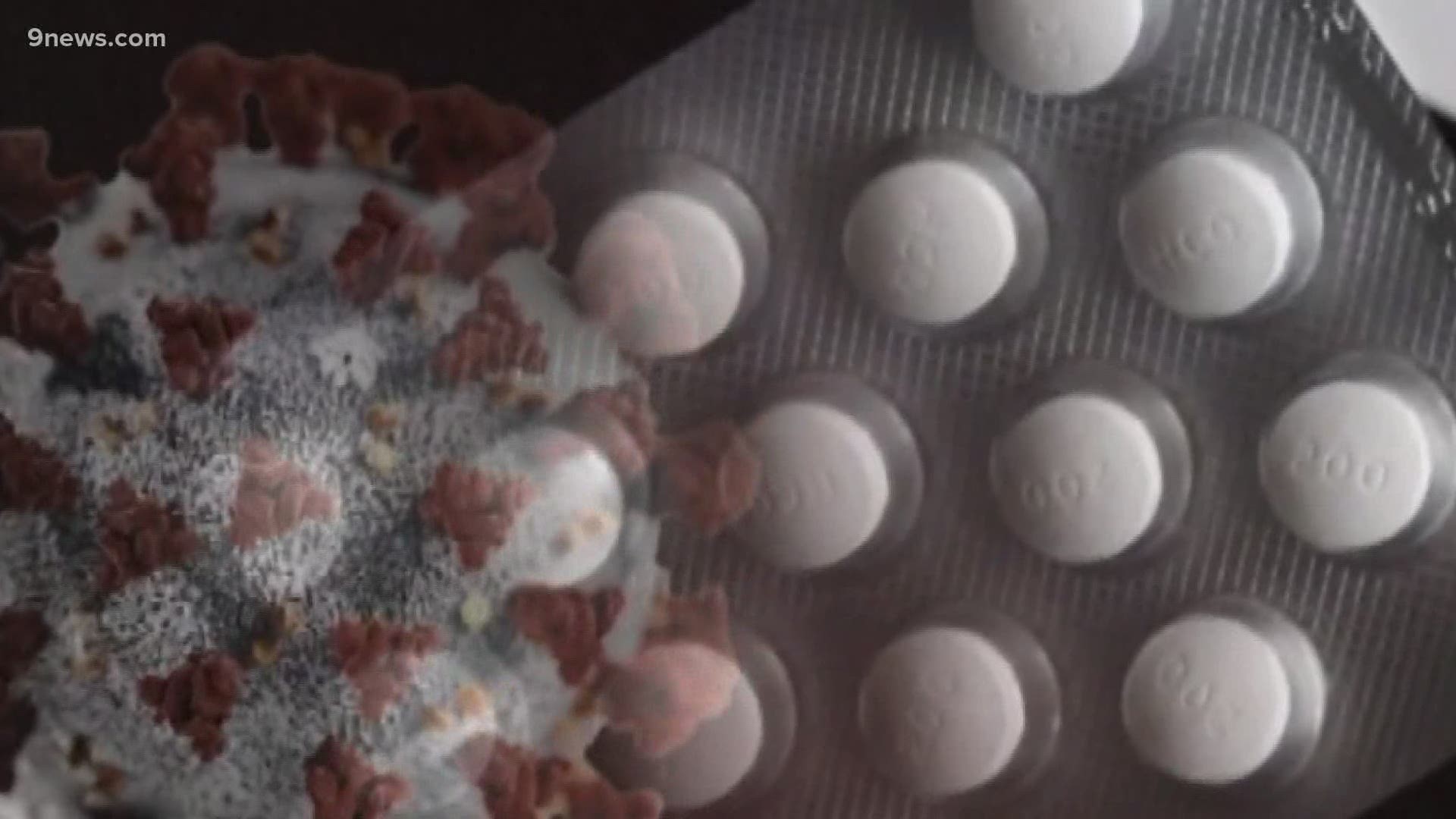DENVER — While scientists are testing anti-malarial drugs to treat COVID-19, people are finding ways to get prescriptions just in case, making it difficult for those with auto-immune disorders to get the medication they need.
“[My pharmacist told me they were] seeing a flood of new prescriptions coming in from people who have never taken the meds before, never been diagnosed,” Chris Cingrani said.
Cingrani was diagnosed with Sjogren's syndrome in 2018 and was given a medication called Hydroxychloroquine, which is derived from a drug made to treat malaria, but found to be helpful for people with lupus, rheumatoid arthritis, and other autoimmune disorders.
“Without it, I think I’d still be struggling a lot, especially with the fatigue and just getting sick and worn down.”
With help from his doctor, Cingrani was finally able to get his prescription filled.
9NEWS spoke with dozens of other patients in Cingrani’s position who have had a hard time getting their medication.
“I understand the fear,” UCHealth Rheumatologist Dr. Kevin Deane said. “However, we don’t know that the medicine works [for COVID-19].”
Dr. Deane said his patients have had to call around for the drug, but so for they all have eventually been able get their prescriptions filled despite what the FDA is calling a shortage.
Dr. Deane wants to caution people who already have the medication to be careful about taking them without doctor supervision.
“All medicines have some side effect of some kind, and it’s always a balance,” Dr. Dean said, “With RA and Lupus, we use this drug and we’re very comfortable with that because those two diseases are terrible, and any side effect of the drug is minimal [comparatively]. But if we don’t know it works [for COVID-19], then you could be only exposing yourself to bad side effects and getting nothing good out of the medicine.”
Those side effects include heart problems and retinopathy. The Mayo Clinic lists dozens more HERE.
“We’re trying to strike a balance between making something with a potential of an effect to the American people available,” Dr. Anthony Fauci, the director of the National Institute of Allergy and Infectious Diseases and a member of the White House Coronavirus Task Force, said on a March 21st briefing. “At the same time that we do it under the auspices of a protocol that would give us the information to determine if it’s truly safe and truly effective.”
9Health Expert Dr. Payal Kohli agrees that there’s not enough evidence.
“The data is extremely mixed and it’s not clear to use whether this drug even works,” Dr. Kohli said. The studies that have been completed out of France and China have been with small groups without control arms, according to Dr. Kohli.
“All of these [positive] studies have actually looked at patients with very mild illness, and what we know about the disease is about 80 percent of people with mild illness will recover on their own. So scientifically, we cant really hang our hat on that data.”
The most recent study out of France showed that the drug was ineffective at best. This was also a small group, 11 people, all of whom had severe cases of COVID-19.
Still, President Trump has been touting the drug’s potential for weeks.
Wednesday, the CDC removed highly unusual guidance on their website telling doctors how to prescribe two anti-malaria drugs, hydroxychloroquine and chloroquine, according to NBC News. Now, the website just says that the drugs are undergoing clinical trials.
A large study is happening in New York that scientists are eager to get the results of, which should give us a bigger picture of what we’re dealing with.
Results should be out by this summer.
9NEWS reached out to both Walgreens and CVS about how they are filling prescriptions of Hydroxychloroquine. Here are their responses:
CVSHealth:
“We’re balancing the growing interest in off-label use of certain prescription medications to treat COVID-19 pneumonia with the ongoing needs of patients and members who are prescribed these drugs to help manage chronic conditions such as lupus, HIV, rheumatoid arthritis and asthma.
We are seeing increased demand for medications being prescribed to treat COVID-19 and our pharmacies have experienced some temporary out of stocks. As it was prior to the COVID-19 pandemic, it’s not uncommon for pharmacies to have temporary out of stocks of individual products and our pharmacies have standard processes in place to resolve those situations. We are also aware of the FDA’s recent announcement regarding a shortage of hydroxychloroquine in the U.S. marketplace.
Our pharmacies are following dispensing guidelines regarding the use of these medications for COVID-19 that have been established in certain states. In states with no guidelines, our pharmacies are limiting the dispensing for COVID-19 treatment to a 10-day supply with no refills.
Our goal is to limit stockpiling of medication that could result in future shortages and gaps in care.”
Walgreens:
"At this time, Walgreens has maintained an adequate supply and inventory of these medicines and are able to meet the prescription needs of our current patients. Patients with questions about their medications can reach out any time via phone or using the pharmacy chat option available on Walgreens.com and Walgreens app.
To help ensure these medicines remain available for existing patients, Walgreens issued guidelines to our pharmacies on prescriptions for chloroquine or hydroxychloroquine for existing and new patients who do not have a prior history of use. These guidelines are as follows:
- 14 day supply limit for new prescriptions
- 30 day supply limit for refill or prescriptions with a prior history of use
- All active 90 day-prescriptions should be limited to 30 days
Our pharmacies were also reminded to follow the requirements in their state, which may be more restrictive."
SUGGESTED VIDEOS | Local stories from 9NEWS

